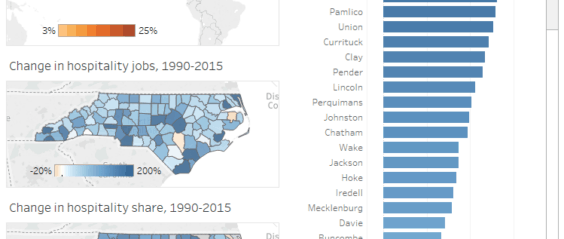Contextual Healing
Brookings had an especially strong publishing flurry at the end of May. For anyone looking for a positive spin on the state of Congress, check out “Eight good pieces of news about Congress.” It is a quick read with some useful links. In addition, Duke University professor Indermit Gill published an interesting article on impact investing and impact sourcing.
In the Weeds
There were two interesting posts this week expounding on the 2016 election results.
- A post in the New York Times Sunday Review summarizes recent psychological research examining why citizens on both sides of the political spectrum do not always revise their beliefs in response to new information. There is a commonly held theory of confirmation bias which is the psychological tendency to favor information that confirms our beliefs and to disfavor information that counters them. The new research suggests that we may not be just biased towards our beliefs but also biased towards information that confirms our desired outcomes. For example, if a person wanted Jeb Bush to win the Republican primary, she may be more disposed to remember and/or believe polling information that supports that result and ignore information that shows a different outcome.
- The New York Times Upshot blog describes discussions at the American Association for Public Opinion Research annual conference about why polls were wrong about the presidential election outcome. For those interested in polls and elections, it is a thorough read. The basic overview suggests explanations in one of several categories:
- Undecided voters turned to Trump
- Likely voter screens may have tilted polls in Clinton’s direction
- Voter education levels were not accurately reflected in polling samples.
Dropping Knowledge
Mary Meeker, a preeminent expert on the internet and a partner in venture capital firm Kleiner Perkins, presented her annual “Internet Trends” findings on Wednesday. At 355 slides, it is a doozy but well worth a skim. Here are a few highlights:
- In the U.S. in 2016, 60 percent of the most highly valued tech companies were founded by first- or second-generation Americans and are responsible for 1.5 million employees. Those companies include tech titans Apple, Alphabet, Amazon and Facebook.
- Siri and Cortana are hits. Twenty percent of mobile queries were made via voice in 2016, while accuracy is now about 95 percent.
- 25 percent of Americans own a wearable health device, with 60 percent of consumers willing to share health data.
The Next Evolution
Following last week’s Insight column on autonomous vehicles, there were two interesting articles about electric flight. Wired published a piece that describes the technology shifts that need to occur for electric flight to be a reality. Bottom line: it all comes down to battery weight and is likely 30 years away. Engadget describes how the future of electric air travel will likely be in the form of air taxis and not individual vehicles.
What we're reading
A Tale of Two States IV: Hospitality Jobs
UNC CURS has provided their fourth installment of job growth analysis in North Carolina. This latest update focuses on the hospitality industry and has great statewide and county-specific data.... Read the rest-
What if the Treasury Department Handled Student Loans?
-
The US Has Forgotten How to Do Infrastructure
-
Technology is making the world more unequal. Only technology can fix this
-
The People Left Behind When Only the 'Deserving' Poor Get Help
-
The problem with millennials isn’t millennials—it’s how you’re leading them
-
Teachers Unions Prepare for Thousands of Lost Members as New Case Moves Toward the Supreme Court


